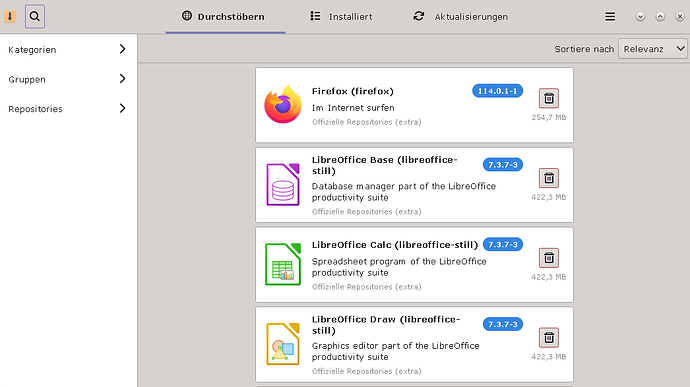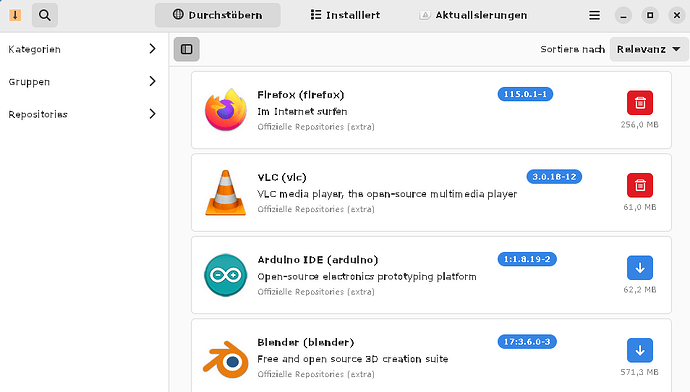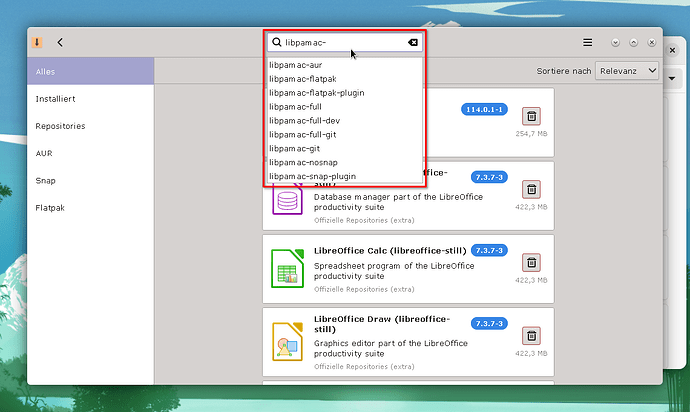But how do I do this most cleverly?
I use Manjaro KDE/Plasma (Just checked … GTK design: Breeze).
For fonts, I have anti-aliasing disabled system-wide (with hinting enabled), and use Verdana as the system font.
So far I have only updated in the VM.
Before update, the Pamac GUI looked like this on my system:
After the update it looks like this:
Only very badly readable (in the original and in original size you can see the differences even better)!
Currently installed is pamac-gtk 10.5.1-2.
This will/would be updated to pamac-gtk 11.0-1-2.
After that I would “downgrade” again to pamac-gtk3 10.5.3-4.
I did so in the VM, but after that the libpamac-snap-plugin previously installed in Pamac was gone.
An installation attempt of libpamac-snap-plugin aborted with an error message that not all packages could be loaded.
The exact error message is (unfortunately) in German:
~ pamac install pamac-gtk3 ✔
Vorbereitung...
Wähle die optionalen Abhängigkeiten für pamac-gtk3:
1: pamac-gnome-integration: for integration into GNOME
2: libpamac-snap-plugin: for Snap support
Auswahl eingeben (Standard=keine): 2
Abhängigkeiten werden aufgelöst...
Interne Konflikte werden überprüft...
Wird installiert (6):
pamac-gtk3 10.5.3-4 extra 197,4 KB
apparmor 3.1.6-1 (Benötigt von: libpamac-snap-plugin) extra 1,2 MB
squashfs-tools 4.6.1-1 (Benötigt von: libpamac-snap-plugin) extra 223,5 KB
snapd 2.60.1-1 (Benötigt von: libpamac-snap-plugin) extra 26,5 MB
snapd-glib 1.63-3 (Benötigt von: libpamac-snap-plugin) extra 1,0 MB
libpamac-snap-plugin 11.5.6-1 extra 30,8 KB
Wird entfernt (1):
pamac-gtk 11.0.1-2 (Konflikt mit: pamac-gtk3) extra
Download-Größe gesamt: 29,3 MB
Gesamtgröße installiert: 78,6 MB
Gesamtgröße entfernt: 585,6 KB
Transaktion anwenden ? [j/N] j
==== AUTHENTICATING FOR org.manjaro.pamac.commit ====
Eine Authentifizierung ist erforderlich, um Pakete zu installieren, aktualisieren oder zu entfernen
Authenticating as: john
Password:
==== AUTHENTICATION COMPLETE ====
Herunterladen von apparmor (3.1.6-1) gestartet
Herunterladen von squashfs-tools (4.6.1-1) gestartet
Herunterladen von squashfs-tools (4.6.1-1) beendet
Herunterladen von snapd (2.60.1-1) gestartet
Herunterladen von apparmor (3.1.6-1) beendet
Herunterladen von pamac-gtk3 (10.5.3-4) gestartet
Herunterladen von pamac-gtk3 (10.5.3-4) beendet
Herunterladen von snapd-glib (1.63-3) gestartet
Herunterladen von snapd-glib (1.63-3) beendet
5,7 MB/29,3 MB
https://mirror.alpix.eu/manjaro/stable/extra/x86_64/libpamac-snap-plugin-11.5.6-1-x86_64.pkg.tar.zst: Fehler 404
6,6 MB/29,3 MB
https://ftp.halifax.rwth-aachen.de/manjaro/stable/extra/x86_64/libpamac-snap-plugin-11.5.6-1-x86_64.pkg.tar.zst: Fehler 404
8,7 MB/29,3 MB
https://ftp.gwdg.de/pub/linux/manjaro/stable/extra/x86_64/libpamac-snap-plugin-11.5.6-1-x86_64.pkg.tar.zst: Fehler 404
Herunterladen von snapd (2.60.1-1) beendet
29,2 MB/29,3 MB
https://mirror.alpix.eu/manjaro/stable/extra/x86_64/libpamac-snap-plugin-11.5.6-1-x86_64.pkg.tar.zst: Fehler 404
https://ftp.halifax.rwth-aachen.de/manjaro/stable/extra/x86_64/libpamac-snap-plugin-11.5.6-1-x86_64.pkg.tar.zst: Fehler 404
https://ftp.gwdg.de/pub/linux/manjaro/stable/extra/x86_64/libpamac-snap-plugin-11.5.6-1-x86_64.pkg.tar.zst: Fehler 404
Fehler: Vorgang konnte nicht abgeschlossen werden: konnte ein paar Dateien nicht empfangen
After a
sudo pacman-mirrors --geoip
it worked after all. (I don’t know if this command could have helped to solve the problem at all, maybe it was just a coincidence that it suddenly worked after all).
After that, the Pamac GUI looks the same as before!
Is this the way? Do I really have to do it this way?
Or is it somehow more elegant to replace pamac-gtk with pamac-gtk3 before the update?
And: Depending on how I install pamac-gtk3 (e.g. if I do it via pamac from the console) I am asked if I want to install two optional dependencies:
1: pamac-gnome-integration: for integration into GNOME
2: libpamac-snap-plugin: for Snap support
- is clear, I want to install, but fails at first, as described above.
But what’s up with 1), should I install this, what can this be good for?
And for future reinstallations, do I then always have to uninstall pamac-gtk and install pamac-gtk3 (if I want to have a clear readable font)?
Sorry, this is partially translated with deepl.com!


